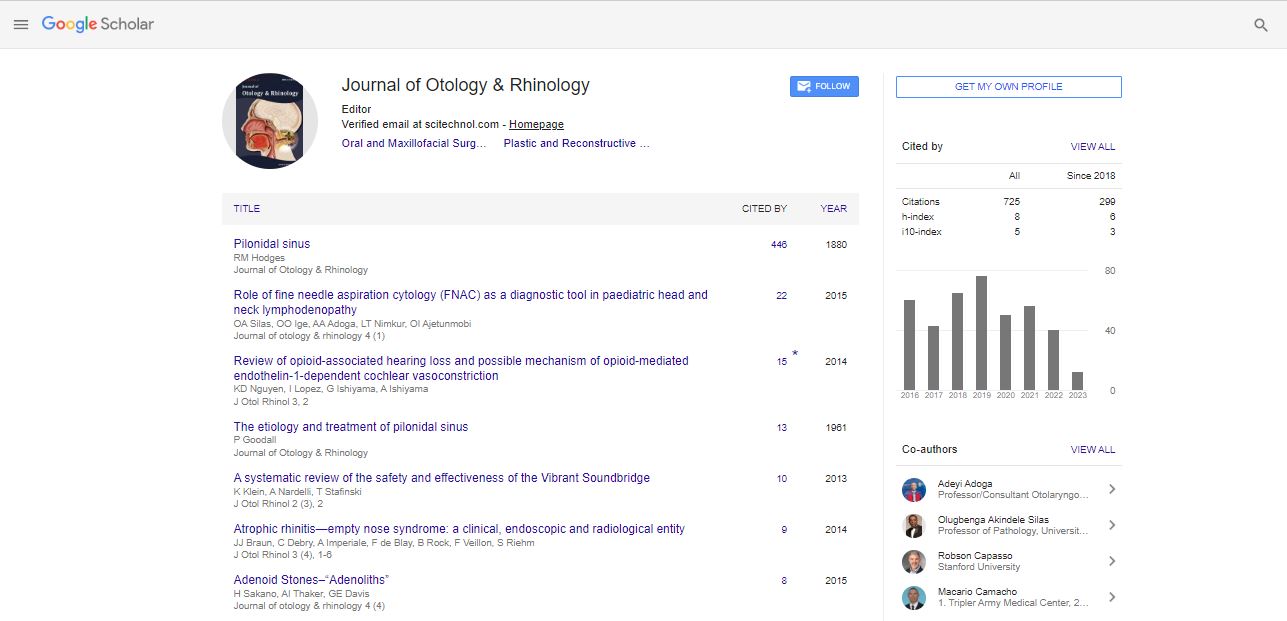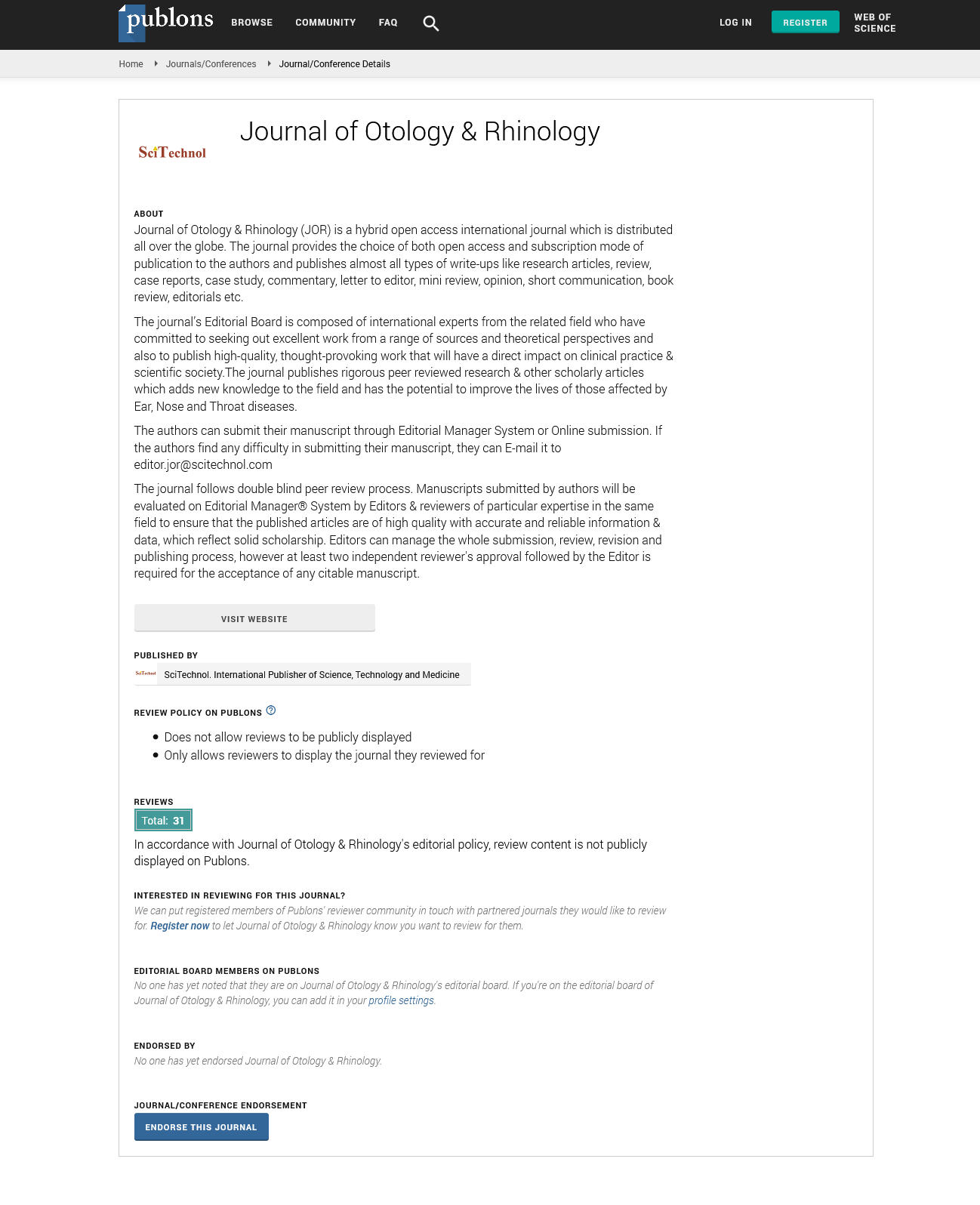Commentary, J Otol Rhinol Vol: 12 Issue: 5
The Implications of Ankyloglossia on Health and Well-Being
Hans Donna*
1Department of Medicine and Health, University of Sydney, Sydney, Australia
*Corresponding Author: Hans Donna,
Department of Medicine and Health,
University of Sydney, Sydney, Australia
E-mail: donnahans@gmail.com
Received date: 18 August, 2023, Manuscript No. JOR-23-118303;
Editor assigned date: 21 August, 2023, PreQC No. JOR-23-118303 (PQ);
Reviewed date: 04 September, 2023, QC No. JOR-23-118303;
Revised date: 11 September, 2023, Manuscript No. JOR-23-118303 (R);
Published date: 18 September, 2023, DOI: 10.4172/2324-8785.100067
Citation: Donna H (2023) The Implications of Ankyloglossia on Health and W ell-Being. J Otol Rhinol 12:4.
Description
Ankyloglossia, commonly known as tongue tie, is a congenital condition characterized by a short, tight band of tissue beneath the tongue, which can restrict its range of motion. The disputes surrounding the condition and the growing interest in its impact on breastfeeding, speech, and overall quality of life.
Etiology: Ankyloglossia is a congenital condition that can be attributed to genetic factors and the interplay of environmental influences. Though its exact cause remains uncertain, several theories suggest a genetic predisposition to the condition, as it often runs in families.
Clinical presentation: The presentation of ankyloglossia can vary widely. Common signs and symptoms include:
• Difficulty or pain in breastfeeding for infants, due to an inability to latch properly.
• Speech difficulties, particularly in articulating certain sounds and speech patterns.
• Lingual discomfort or pain when trying to extend the tongue.
• Potential social and psychological consequences, such as diminished self-esteem and confidence, especially in children and adults.
Diagnosis: Diagnosing ankyloglossia typically involves a thorough clinical examination. Healthcare providers may assess the length and mobility of the lingual frenulum, as well as the potential impact on oral function. Furthermore, professionals may employ various assessment tools, including the Hazelbaker Assessment Tool for Lingual Frenulum Function (HATLFF) and the Kotlow Tongue-Tie Assessment Tool, to determine the severity of ankyloglossia.
Impact on breastfeeding: One of the most difficcult aspects of ankyloglossia is its impact on breastfeeding. Infants with ankyloglossia may struggle to achieve a proper latch during breastfeeding, leading to discomfort for both the baby and the mother. Early diagnosis and intervention are important to support successful breastfeeding. Procedures like frenotomy, the surgical release of the frenulum, are often performed to alleviate this issue.
Impact on speech: Ankyloglossia can also affect speech development. Individuals with severe cases of tongue tie may have difficulty pronouncing certain sounds, particularly those that require a free range of motion of the tongue. Speech therapy and corrective surgeries are sometimes recommended to address speech-related issues.
The management of ankyloglossia has generated substantial debate within the medical and dental communities. Some professionals argue that ankyloglossia is overdiagnosed, leading to unnecessary treatments. Others maintain that untreated ankyloglossia can lead to more significant issues later in life, including dental problems and speech difficulties. Balancing these viewpoints is essential to providing effective, evidence-based care.
Treatment options: The primary treatment for ankyloglossia is a surgical procedure called frenotomy or frenuloplasty. During this procedure, the tight lingual frenulum is released to allow for greater tongue mobility. The decision to pursue surgical intervention depends on the severity of the condition, its impact on oral function, and the individual's specific needs. Postoperative care and exercises to improve tongue mobility are often recommended.
Ankyloglossia, or tongue tie, is a condition that affects individuals from infancy to adulthood, impacting various aspects of oral function and overall quality of life. Early diagnosis and management are important for infants, particularly in the context of breastfeeding. Additionally, speech therapy and surgical intervention may be necessary to address ankyloglossia-related speech issues. Despite ongoing controversies, a multidisciplinary approach involving healthcare providers, speech therapists, and dentists is essential for providing the best care and improving the well-being of individuals with ankyloglossia. Further research is needed to better understand the long-term outcomes and the most effective treatment strategies for this condition.
 Spanish
Spanish  Chinese
Chinese  Russian
Russian  German
German  French
French  Japanese
Japanese  Portuguese
Portuguese  Hindi
Hindi 


